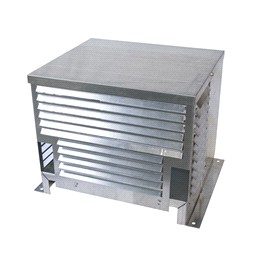An uncommon question we get from time to time, about wine cellar cooling systems, that we believe is very important to address is: Should I heat my wine cellar?
The short answer is NO.
While this issue does not come up much in California in some parts of the US and Canada such as Maine, New Hampshire and New York all of which are prime wine cellar markets it can be a real concern.
 Any outdoor components of a wine cellar refrigeration system should always be protected from weather. For most of the country an outdoor enclosure is sufficient. It keeps out foliage and critters like rodents or lizards in search of a warm place when the temperature dips. In areas that will see temps below 40°F for more than a couple days at a time a Low Ambient kit should be added. We install it prior to shipping and it will protect the condensing unit from harsher conditions.
Any outdoor components of a wine cellar refrigeration system should always be protected from weather. For most of the country an outdoor enclosure is sufficient. It keeps out foliage and critters like rodents or lizards in search of a warm place when the temperature dips. In areas that will see temps below 40°F for more than a couple days at a time a Low Ambient kit should be added. We install it prior to shipping and it will protect the condensing unit from harsher conditions.
For indoor components, some companies offer heating elements to go along with their wine cooling equipment. This is an easy way to short cut genuine issues with the construction of a Residential Custom Wine Cellar or Commercial Wine Display Cabinet Enclosure. Issues that can threaten the longevity of your investment in both a wine collection and the long-term operational cost of your cellar. Northern areas with basement wine cellarsthat have little or no insulation can see temperatures below what is optimal for storage in the colder months of the year. These wine rooms are likely to not have a vapor barrier. In the long run not installing a good vapor barrier is far more risky. Adding a heating element or “re-heater” is a band-aid on a gunshot.
Adding a “re-heater” does not address the very real problems associated with lack of insulation or a missing vapor barrier. It may initially be cheaper to add a heater but in the long run it is very likely to cost significantly more. Insulation will keep the temperature more consistent, consistency is more important than the temperature itself. Temperature variance can be more damaging than absolute temperature. The great thing about basements is they have so much thermal mass the liquid temperature barely budges!
For more info on temperature measurement see our wine cooling systems tech page.
Some experts go as far to say that cooler temps merely slow down the aging process, not change it or stop it. This is more of an argument with white wines than it is reds. Whites are slightly more fragile at very cold temperature for long term storage. Even still it is widely agreed upon that sudden changes and stability matter far more than the annual gradual dip and slowing of the aging process.




